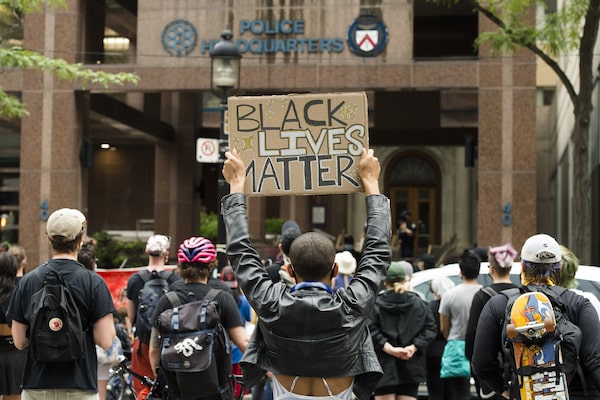
People protest in front of Toronto Police Service headquarters, in Toronto, on July 16, 2020.Nathan Denette/The Canadian Press
The Ontario Human Rights Commission has put forward more than 100 recommendations to the Toronto Police Service, including calling on them to make a “legally enforceable” commitment to change, in a report that concludes anti-Black racism remains rife within the force.
The report, From Impact to Action, is the third and final publication out of a public inquiry launched in 2017 to address anti-Black racism, discrimination and profiling by the country’s largest municipal police service. Among other things, it calls on Toronto Police to destroy historical street-check data, consider equity audits of laid charges, expand the collection of race-based data, and develop a formal and distinct policy on racial profiling.
“The report’s findings are clear: Systemic racial discrimination, racial profiling, and anti-Black racism exist wherever Black people interact with Toronto Police Service. Black communities have been experiencing that for decades – and to its credit, the Toronto Police Service has acknowledged this publicly,” OHRC chief commissioner Patricia DeGuire said at a press conference Thursday.
The report combines data analysis with survey and interview results, chronicling the extensive harm suffered by Black communities as a result of both underpolicing and overpolicing.
“These recommendations set forth a path of meaningful action to change outcomes for Black communities, and to transform the culture of policing and even policing across Ontario,” Ms. DeGuire said.
Two previous reports have been published as part of the public inquiry, which was launched in 2017.
The first, in 2018, looked at data collected by the Special Investigations Unit, a civilian oversight agency that probes all cases in Ontario in which people were allegedly seriously injured, sexually assaulted or killed by police. That report found that Black people were disproportionately overrepresented in all areas, especially fatal shootings.
The second report, published in 2020, analyzed use-of-force data in lower level cases, not considered serious enough to meet the threshold of being investigated by the special unit. It found that Black people were once again “grossly overrepresented” – present in 38.9 per cent of cases, even though they constitute 8.8 per cent of Toronto’s population.
“Those reports confirmed what Black communities have been saying for decades: that Black people bear a disproportionate burden of law enforcement,” Ms. DeGuire said Thursday.
This final inquiry report, she said, focuses on the policy and accountability gaps – both within Toronto Police and services across Ontario – that hinder efforts to address anti-black Racism in policing and make meaningful change.
She said the commission’s report comes with more than 100 recommendations that, if put into action, “will help address these gaps, and set forth pathways to meaningful action to change outcomes for Black communities.”
One of the recommendations calls on the service to create “an independent monitoring and evaluation system for the implementation of the recommendations that involves an effective and expeditious legally binding enforcement measure.”
Another calls on Toronto Police to “ensure that its procedures on laying a charge require that officers approach all interactions with Black and other racialized individuals in ways that consider their histories of being overpoliced, and consider the use of alternatives to charges and arrests, where appropriate.”
In a joint statement Thursday, Toronto Police and its Police Services Board wrote that they welcome the report, “and view it as an important contribution to the work already under way in our continued efforts to proactively and decisively address anti-Black racism.”
“We readily accept that there is more and challenging work to be done, and we welcome the OHRC’s report as an important resource for us as we continue this work. We will continue to work to identify how best to move forward within the spirit of the report,” Chief Myron Demkiw said.
Ms. DeGuire said a written commitment will not be enough. She hopes to see Toronto Police “commit to implementing these recommendations through systemic and concrete action that are monitored independently and legally binding.”
“The decades of reports and calls for action from Black communities show that if the Toronto Police and the board are committed to change, they must legally bind themselves to that change.”
A handful of recommendations are also directed at the provincial government – including around provincewide collection of race-based policing data, as well as training for members of the legal system, including assistant crown attorneys.
“The government has confidence in Ontario’s police services and police chiefs to maintain positive relationships with the communities they serve,” said Greg Flood, spokesperson for the Ministry of the Solicitor General.
”We are ensuring that police services are equipped with the proper training and techniques to respond to incidents safely for both police and the public, and the resources they need to protect Ontario communities.”
Michael Harris, acting executive director for the OHRC, said data will continue to be a critical accountability tool.
“Real change requires accountability, and data collection is a key component to establish accountability. The Toronto Police must appropriately and effectively collect data related to racial profiling and discrimination from a broad range of police interactions,” he said.
For example, the report highlights that even after the province implemented regulations that all but eliminated the controversial practice of “carding” or street checks – which data showed disproportionately targeted Black and other racialized people – surveys showed Black people are still concerned about experiencing disproportionate random stops.
The service has begun to collect race-based data around use of force, strip searches and arrests, Mr. Harris acknowledged.
But he stressed that such efforts – not just within Toronto Police, but by all police services across Ontario – must go further, and “collect data for all stops, including investigative detentions, protective searches, and frisk searches.”
Mr. Harris also said police services must do a better job of monitoring negative findings about officer testimony or conduct in court or tribunal decisions – and use race-based data to track potential discriminatory conduct by officers.
 Molly Hayes
Molly Hayes